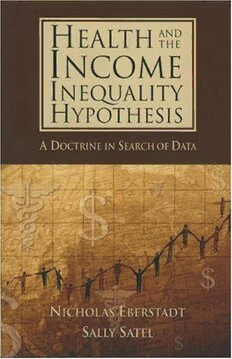
Health and Income Inequality Hypothesis: A Doctrine in Search of Data PDF
56 Pages·2004·0.195 MB·English
Most books are stored in the elastic cloud where traffic is expensive. For this reason, we have a limit on daily download.
Preview Health and Income Inequality Hypothesis: A Doctrine in Search of Data
Description:
Few would take exception to the proposition that an improvement in the material well-being of the poor would enhance not only their living standards but their health as well. A number of influential recent studies, however, purport to show that inequality in income--not poverty per se--is bad for people's health. This "inequality hypothesis" is meant to apply to everyone, regardless of wealth or social standing, and predicts that the risk of illness depends upon whether one lives in a society that is stratified or egalitarian. Thus, according to this hypothesis, while the poor may suffer the most from inequality, the better off and even the rich suffer as well. The enthusiasm many researchers and observers feel for this theory goes well beyond what might be justified by the evidence. The inequality hypothesis too often relies upon limited or unrepresentative data, hazily expounded causality, elementary econometric fallacies, and results that cannot be replicated. A very persuasive (although less publicly heralded) body of scholarship that challenges the inequality hypothesis is currently emerging. For example, by controlling for relevant variables--such as household income, maternal characteristics, education, and race--the relationship between income inequality and the health of infants and adults diminishes or disappears completely. This strongly suggests that income distribution is far less powerful a determinant of population health than the inequality hypothesis holds.
See more
The list of books you might like
Most books are stored in the elastic cloud where traffic is expensive. For this reason, we have a limit on daily download.
